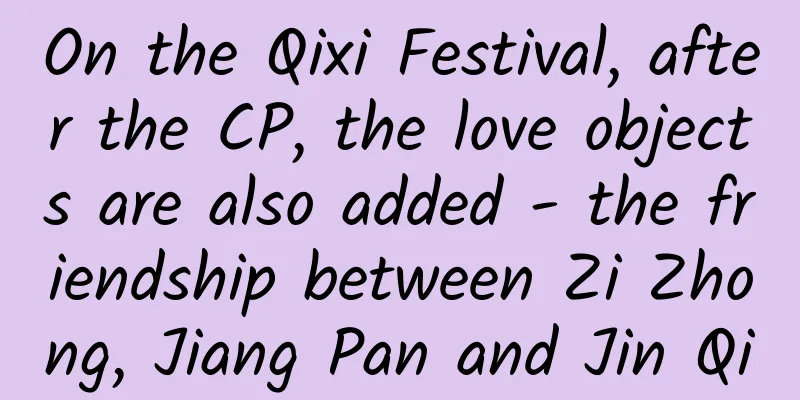On the Qixi Festival, after the CP, the love objects are also added - the friendship between Zi Zhong, Jiang Pan and Jin Qi

|
Qixi Festival, after the CP, the love objects - the friendship between Zi Zhong, Jiang Pan and Jin Qi Zhang JinMember of the Intangible Cultural Heritage Working Committee of China Arts and Crafts Association Lv Weitao, Curator at the National Museum of China Origin: In ancient times, lovesickness was as deep as the sea, and the Qixi Festival re-tasted the old "dog food" Qixi Festival is a romantic festival that originated from the ancient Chinese tradition of "Double Seventh Day". The seventh day of the seventh lunar month is an auspicious day accepted by all walks of life. When the legend of the Cowherd and the Weaver Girl was incorporated, the romance of Qixi Festival was greatly increased and has been passed down to this day. When it comes to love, people in ancient times and today are the same. Even when it comes to expressing their love, the ancients were no more reserved than we are. They were so unrestrained and direct that even people with social phobia today would feel ashamed. The well-known line "A graceful lady is the ideal match for a gentleman" in the opening of the Book of Songs, "Zhou Nan Guanju", expresses the pursuit of a "gentleman" (noble) for a "lady" without any affectation. The whole poem describes how he felt distressed when he could not get the "lady" and how he could not sleep. When he got the "lady", he was very happy and asked people to play music to celebrate and make the "lady" happy. This is a man chasing a woman. The woman chasing a man is also very clear. In the "Zheng Feng·Wind and Rain" in the "Book of Songs", it is written: "The wind and rain are dark, and the cocks are crowing incessantly. Now that I have seen a gentleman, how can I not be happy?" It was raining and windy outside, and the cocks were crowing incessantly. The woman unexpectedly "saw" her long-lost lover; the joy and happiness of seeing him suddenly jumped out of the paper, and she was just short of saying "I love you, I love you" directly. The Book of Songs contains works from the Former Qin Dynasty, which shows that the love between men and women in that era was expressed frankly. In fact, writing love letters, sending gifts, and dating, what we do now, our ancestors have done. Today's protagonist is the gift that a noble man in the Spring and Autumn Period gave to his wife - the Zi Zhong Jiang Plate. Let us also taste this "dog food" from 2,600 years ago. Male protagonist: Wen Qing Qu Qi has many talents, and the master sings a righteous song The Zi Zhong Jiang Plate is a bronze plate for washing hands. It was unearthed in Shanxi, which was the territory of the State of Jin during the Spring and Autumn Period. The man who sent the bronze plate did not leave his name. We can only know his official title from the inscription on the plate - Master. In the State of Jin, the Master was in charge of the performance of national rituals and music, and must be a person who is proficient in music and poetry. This young man from the State of Jin was able to serve as a Master, and he was undoubtedly a true literary youth. Shi Kuang (572-532 BC), a great musician of Jin State in the late Spring and Autumn Period, also served as a court musician. He was praised as the "Saint of Five Tones" at that time, and was later called the "Saint of Wisdom" and "Saint of Music". Shi Kuang was blind, but he had extraordinary hearing. He was not only familiar with qin music, but also good at using the sound of the qin to describe the soaring, chirping, and graceful dance of birds, as well as the various shocking sounds of nature such as wind, rain, thunder and lightning. Shi Kuang's hearing was much more sensitive than that of the bell-casting musicians of Jin State. Once, he heard that the pitch of the bell cast by Duke Ping of Jin was not accurate, so he told him directly. Duke Ping of Jin did not take it seriously, and later it was confirmed by the musician Shi Jun of Wei State that it was true. Judging from the era, the owner of Zi Zhong Jiang Pan was Shi Kuang's predecessor. Even if he did not reach Shi Kuang's level, he was still rare at the time. After all, ritual and music occupied an important position in political life at that time, and the requirements for musicians were indeed not low. Heroine——You admire Yixi’s good figure, and you miss Yixi’s gift of a wash basin The object of the Jin master's affection was a noble lady from Qi. At that time, the two countries of Jin and Qi were on good terms, and intermarriage between nobles was still frequent. The Qi lady was called Zhong Jiang. Jiang was her surname, and Zhong meant the second child. She could be called the second lady of the Jiang family. Qi was the fief of Jiang Ziya, an important minister of the founding of the Zhou Dynasty. It was not until 391 BC that Tian He abolished Duke Kang of Qi and established Tian Qi, which is known in history as "Tian replaced Qi". Before that, Jiang had always been the national surname of Qi, which shows that the status of this second lady was not low. The daughters of the Jiang family in Qi were often good-looking and well-educated, and many of them married the kings or nobles of neighboring countries, such as Duke Zhuang of Wei and Duke Wen of Jin. I think the second daughter of the Jiang family was also a charming woman. Love objects - Zi Zhong Jiang Pan expresses his love for his wife, and his magical skills are familiar with the past and present The Zi Zhong Jiang Plate given by the master of the Jin State to the second daughter of the Jiang family was an expression of his love. It was cast in the early Spring and Autumn Period 2,600 years ago. It is 18 cm high, 45 cm in diameter and weighs 12.4 kg. It is now one of the treasures of the Shanghai Museum. This plate is used to collect water for washing hands. What is special about it is that there are 12 round-carved animals in the plate. In the center is a male waterfowl with a crown on its head. In the second circle of the inner circle are four round-carved fish. In the third circle are four female waterfowl without crowns on their heads. In the fourth circle are four crouching frogs (one of the frogs is missing). In addition to these three-dimensional round-carved animals, there are also some shallow relief animals, such as turtles, frogs, and small fish. These animals are vividly portrayed, with details clearly visible. What is even more amazing is that when water is poured, the round animals in the plate can move 360 degrees, as if dancing in the water. How is this done? Using computed tomography, or CT, the archaeologists studied the insides of the animals and found that they were connected to the bottom of the dish by a circular shaft. The frog was mounted on a mushroom-shaped shaft that connected to the bottom of the dish so that it would not fall off no matter how hard it fluttered. The fish and birds were held in place by a sword-like shaft to prevent them from falling off. The craftsmen must have designed different shafts based on the different shapes of the animals in the round and must have conducted repeated experiments, which was a great effort. During the Spring and Autumn Period, bronze vessels were only used by the nobility and were not allowed by the common people. This plate is both precious and exquisite. No other bronze plates unearthed so far have a more exquisite design than this one. From this, we can imagine how much Master Jin liked and was satisfied with this finished product when he saw it, and we can also see how much he liked his wife. When the second daughter of the Jiang family bathed and dressed in her boudoir, she would use this plate to wash her hands before going to a banquet or going out for an outing with her husband. She listened to the crisp sound of the falling water hitting the bronze plate, and watched the fish, frogs and water birds slowly submerged in the water. The small animals swam around, jumped lightly, or flapped their wings, full of vitality, and the whole house was full of life. Miss Jiang must be able to feel her husband's deep love at this moment. She must be satisfied with having such an artistic husband who understands people's thoughts. How can a rich family have nothing? How many people know the love here? However, for families like the Jin master and the Jiang family's second daughter, why would the gift be a wash basin? Wouldn't it be better to give gold, silver and jewelry? This is not a careless move by the Jin master. In the Spring and Autumn Period, chopsticks were not yet popular. No matter nobles or commoners, they often used their hands when eating. Therefore, washing hands before meals became very important. This was not only for hygiene considerations, but also became an important etiquette, known as the "Washing Ceremony", which was widely used in sacrifices, weddings, master-apprentice ceremonies, banquets for guests and other occasions. "Wo" means pouring water, and "guan" means washing. The ritual of "woguan" means to use a yi (a kind of container, usually with a big belly and a curved mouth) to fill water and pour it from top to bottom, and use this running water to wash the hands of guests or important people. There is a matching bronze plate at the bottom to collect the water for washing hands. After washing hands, a handkerchief is handed over to dry hands. When receiving important guests, even the host's father and son are required to take part in the process. The father takes the yi to pour water, and the son uses the plate to collect water, and take care of the guests washing their hands to show respect. In fact, the word "洗" in oracle bone script can reflect this etiquette: it looks like a hand reaching into a vessel, and the small dot next to the hand represents water drops, which means washing hands in a basin. This shows that the master of Jin State made such an exquisite wash basin for his beloved wife, which was not careless, but showed respect and love. This set of plates and basins made with great care is much more precious than utensils made of pure gold. Pass this item down to future generations, and hope that they will treasure it forever. Master Jin and Miss Jiang must have loved this unique plate. The frog on the plate has been worn out after long-term use, which shows how much the owner cherishes it. The inscription on the inner wall of the plate has 32 characters, which roughly means: "On the seventh day of the sixth lunar month, the master made a large and good washing plate for his wife Zhong Jiang, wishing her good health and longevity." The last line reads: "To be passed down to future generations as a treasure." Although such words are commonly used in bronze inscriptions, it is likely that the second daughter of the Jiang family would have hoped that such an exquisitely crafted plate could become a family heirloom. Ginger plate, ginger basin, bitter ginseng, Shang, longing for each other, endless As time goes by, the Zi Zhong Jiang Plate was unfortunately lost overseas after it was unearthed in the early years. It is one of the two national treasures that our overseas institutions have been tracking for 9 years. It was later discovered by Ye Zhaofu, chairman of the board of directors of Hong Kong Sun Group Co., Ltd., in an antique shop in Macau, and was purchased and collected for a large sum of money. In 1994, with the assistance of Interpol, after the country learned that the plate was in Hong Kong, the general manager of the State Administration of Cultural Heritage saw the plate at Standard Chartered Bank in Hong Kong, but could not confirm its value. So Ma Chengyuan, director of the Shanghai Museum, and Wang Qingzheng, deputy director, were invited to Hong Kong for appraisal. Mr. Ye received them in his office and watched the plate. At that time, the soil on the plate was still there and had not been processed, but the inscription was clear. The two experts praised it again and again. When Hong Kong returned to China in 1997, Mr. Ye donated the plate to the Shanghai Museum. Unfortunately, the Zi Zhong Jiang Pan was originally paired with a "Zi Zhong Jiang Yi", which has never been publicly seen. However, it is said that someone has seen it in private. The inscription on the inner wall of the Yi is basically the same, except that the "mo pan" is replaced by "wo Yi", proving that this was originally a pair of matching wo wash utensils, both of which belonged to the second daughter of the Jiang family. Unfortunately, the Zi Zhong Jiang Yi is said to be now in a private collection in New York, USA. Panyi and Yi are separated at the two ends of the earth, unable to meet, just like the love between the Cowherd and the Weaver Girl in the Milky Way. However, for Master Jin and the second daughter of the Jiang family, cherishing the time together, washing with Panyi, holding hands and staying together, this is enough. The material possessions of the body, transcending time and space, have brought endless reverie and envy to people today. |
<<: You must understand all this knowledge about the People's Liberation Army!
Recommend
Baidu Apollo launches autonomous driving operation route in Beijing's sub-city center, "Carrot Run" starts in Tongzhou
On August 26, the launch ceremony of autonomous d...
A comprehensive review of China's mobile internet advertising in 2019
The most important turning point is that with the...
4 analysis models for high-conversion products!
Today, I would like to talk to you about the issu...
Analysis of competitive products of Douyin app
With the rapid development of mobile Internet, pe...
The scale strategy failed, and discounts and promotions reversed the decline. How far is Porsche from Jaguar Land Rover?
Recently, some netizens found that the price of P...
A well-known singer fainted due to heat stroke shock. Learn this guide to dealing with heat stroke!
It was reported that singer Eason Chan fainted du...
If an iOS programmer is interviewed like this, the chance of getting an offer on the spot is 80%?
1. Overview Is an interview difficult or not? It ...
Cisco announces 6,000 layoffs: 8% of total employees
Late evening of August 13th, Beijing time, Cisco ...
Musk admits that FSD needs to be improved, "LiDAR is lagging behind", but outsiders say Tesla is writing a blank check
Although Tesla has always been a leader in the fi...
Chengdu tea lovers share resources, don't miss out on reliable resources
Chengdu tea lovers resource sharing appointment a...
While watching the World Cup, also check out this archaeological study on the origin of football!
While watching the World Cup, also check out this...
Cocos & PS4: Sharing mobile games with your family to realize the dream of next-generation consoles
On December 11, Sony officially held a press conf...
It’s been two years since Tianwen landed on Mars. Let’s see whose hometown has landed on Mars?
May 15th marks the second anniversary of Tianwen-...
Community operation: 5 elements and 7 key points of high-quality communities!
Social media has the advantages of low cost and h...









